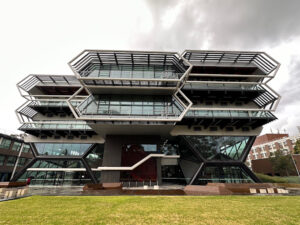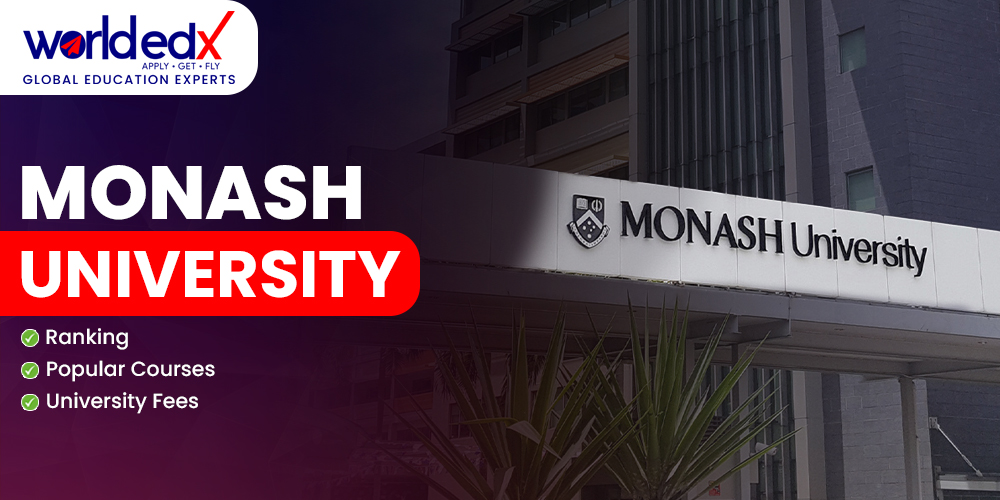Monash University is situated in Melbourne, Victoria, Australia. Established in 1958, it has become the largest university in Australia, with campuses in Australia, Malaysia, China, India, Indonesia and Italy. Monash University was established in 1958 and named after Sir John Monash, an eminent Australian military leader, engineer, and public figure. Monash has four main Australian campuses across Melbourne: Caulfield, Clayton, Parkville and Peninsula.
In terms of infrastructure, Monash boasts state-of-the-art facilities designed to support learning, research, and student life. From cutting-edge laboratories to world-class libraries and sports centres, the university provides students with the resources they need to excel both academically and personally. As graduates of Monash University, students join a vast alumni network of successful professionals and leaders worldwide. This network provides ongoing support and opportunities for networking, further enhancing the value of a Monash education.
Monash University Ranking
Monash University is regarded as one of Australia’s leading universities and is highly respected internationally. Monash University QS ranking is a remarkable feature of the University, consistently under the top 50 university rankings. The various rankings of the university are as follows:

| Ranking Organization | Rank (2024-2025) |
|---|---|
| QS World University Rankings | 37 |
| Times Higher Education World University Rankings | 58 |
| US News Best Global Universities | 35 |
| Academic Ranking of World Universities (ARWU) | 77 |
| QS Graduate Employability Rankings | 54 |
Monash University Courses
The university offers several courses at all levels but students can also select courses according to their interested study areas:
- Accounting & Finance
- Architecture
- Arts, Languages and Humanities
- Business and Leadership
- Computer Science
- Economics
- Engineering
- Environment and Sustainability
- Fine Art and Design
- Health
- Information Technology
- Law
- Media & Communication
- Medicine
- Music and Performing Arts
- Nursing
- Pharmacy and Pharmaceutical Sciences
- Politics, Philosophy and International Relations
- Psychology
- Science
- Teaching and Education
Intakes Open
| July intake | Master of Professional Counselling, Bachelor of Medical Science and Doctor of Medicine | 29th April 2025 |
| All other courses | 10th May 2025 | |
| October intake | All available courses | 9th August 2025 |

Monash University Fees
The fees are calculated based on 48 credit points, equivalent to a standard full-time year’s tuition load. The 2024 fees are:
| Courses | Undergraduate | Postgraduate |
| Architectural Design | A$48,400 | A$47,500 |
| Arts | A$39,000 | A$39,400 |
| Business Administration | A$52,200 | A$61,200 |
| Computer Science | A$49,500 | A$58,350 |
| Health Sciences | A$40,200 | A$49,900 |
| Engineering | A$53,200 | A$55,500 |
| Marketing | A$52,200 | A$53,000 |
| Laws | A$48,700 | A$51,500 |
| Physiotherapy | A$57,200 | A$58,300 |
| Science | A$38,700 | A$51,500 |
Why Monash University?
There are several factors to take into account when selecting a university. You can be assured that you’ve taken the first step towards a successful future by selecting this university:
Top 50 Universities
Monash University stands out as a world-renowned institution, consistently ranking within the top 50 universities globally. The university’s esteemed reputation not only enhances the value of a Monash degree but also opens doors to a wide range of global opportunities, including prestigious scholarships, research collaborations, and career prospects, making it a preferred choice for ambitious students seeking a top-tier education. This prestigious recognition signifies exceptional teaching, research and graduate employability. A degree from here holds weight internationally, opening doors to exciting career opportunities and postgraduate programs worldwide.
Easily Adaptable Study Options
Monash University recognizes that every student’s educational journey is unique, so it offers an adaptable and customizable approach to learning. The university offers study options to suit your needs. Monash’s adaptable learning environment allows you to pursue your academic goals while balancing other commitments in your life. It offers many options for learning to suit the needs of each student, including online courses, traditional classroom learning, part-time study, internships and industry placements. Additionally, the university’s commitment to innovation in teaching and learning ensures that students have access to the latest educational technologies and methodologies.
Talk to an expert for FREE Counselling
International Network
With campuses, partnerships and exchange programs spanning the globe, students have the chance to connect with peers, scholars and industry professionals from diverse cultural and geographical backgrounds. Through exchange programs, study abroad opportunities and international internships, students can immerse themselves in different cultures, gain global perspectives and develop valuable cross-cultural skills essential for success in today’s interconnected world. This global network also opens doors to a wide range of career opportunities and enhances graduates’ competitiveness in the global job market.
Life at Campus
Monash University has a large international student population, creating a vibrant and multicultural campus environment. It provides comprehensive academic support services to help students succeed in their studies. Monash campuses boast modern facilities and amenities designed to enhance the student experience. This includes well-equipped gymnasiums, sports fields, recreational spaces, student lounges, cafes and dining options, ensuring that students have everything they need for a comfortable and enjoyable campus life. On-campus accommodation is a great way to meet new people and get involved in the campus community. Off-campus accommodation can be a more affordable option, and there are many student-friendly neighbourhoods near the university.
University Statistics
| Number Of FTE Students | International student percentage | Student gender ratio(Male & Female) | Students per staff |
| 54821 | 37% | 56 F : 44 M | 32.6 |
| Total Students | International Students | Total Faculty Staff |
| 54384 | 30018 | 3482 |
| UG Students | PG Students | UG Students | PG Students | Domestic Staff | International Staff |
| 72% | 28% | 61% | 39% | 44% | 56% |
Frequently Asked Questions (FAQs)
What opportunities are available for international students to get involved in campus life?
Monash University welcomes international students with open arms, offering a range of activities and support services tailored to their needs. From international student clubs to cultural events and language exchange programs, there are numerous opportunities for international students to connect with their peers, immerse themselves in Australian culture, and feel at home on campus.
What are the specializations offered at the Parkville campus?
The Parkville campus hosts programs in medicine, nursing and health sciences. It features state-of-the-art medical research facilities, teaching hospitals, and clinical simulation centres.
Are there opportunities for work placements or internships during my studies at Monash?
Yes, Monash University has strong industry connections and offers numerous opportunities for work placements, internships, and industry-linked projects. These experiences provide valuable practical skills, industry insights and networking opportunities for students.
Can I participate in study abroad programs at Monash University?
Yes, Monash University offers a range of study abroad opportunities for students to explore. Whether it’s a semester exchange program, short-term study tour or international internship, there are plenty of options to gain valuable global experience while earning credits towards your degree. The university has partnerships with institutions around the world, allowing students to choose from a diverse range of destinations and academic programs tailored to their interests and goals.
How can I get involved in research projects as an undergraduate student at Monash University?
Monash University encourages undergraduate students to engage in research and offers various opportunities to get involved in research projects across different disciplines. Students can participate in research internships, summer research programs, or independent research projects under the guidance of faculty mentors. Additionally, many academic departments offer research assistant positions or undergraduate research conferences where students can showcase their work and network with fellow researchers. Interested students are encouraged to reach out to their professors or research supervisors to explore available opportunities.







